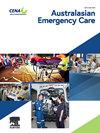急诊科复苏护士的培训需求是什么?范围界定审查。
IF 2.1
4区 医学
Q2 EMERGENCY MEDICINE
引用次数: 0
摘要
背景:急诊复苏护士是急诊科重症监护实践最前沿的一个具有挑战性的专业角色。尽管急诊复苏护士需要具备广泛的专业知识和技能,但在澳大利亚,对于如何以最佳方式提供培训,以实现复苏护士的一系列固定目标和必备技能,目前还没有全州或全国性的统一方法。由于护理人口老龄化和劳动力自然减员的增加,有必要制定一个有效的加速途径来获取专业复苏护理知识。目的:本综述旨在识别、整合和总结有关急诊复苏护士必要临床和非技术技能培训需求的现有证据:有关目前在急诊科工作的护士的论文,包括护理单元管理者 (NUM)、临床护士教育者 (CNE)、临床护士顾问 (CNC)、临床专科护士 (CNS)、注册护士 (RN) 和注册护士 (EN) 均包括在内。综述包括主要研究和非主要研究,其中包括关于如何培训急诊护士的论文。没有设定日期限制,以确保能对所有结果进行审查。非英文发表的论文、包含非急诊室护士的论文或包含医生、专职医疗人员及其他无法区分人群的工作人员的论文均被排除在外。此外,还排除了仅有摘要、社论、会议海报或口头报告的文章:在 MEDLINE、CINAHL 和 EMCARE 中进行了检索。作者对收录的研究参考文献目录以及灰色文献进行了广泛的手工检索,以确保所有相关文献都被收录:方法:进行范围界定文献综述:对最后 33 篇文章(23 篇同行评审研究和 10 篇能力与实践标准文件)进行了数据提取。在复苏护理中,并不存在达到必要的临床和非技术技能能力的具体培训要求。有报告称,如果没有定期强化,能力会下降。结合多种教学方法的多模式方法在提高知识保持率和技能掌握率方面显示出潜力:结论:在澳大利亚,复苏护理缺乏标准化的培训方法,因此在确保护士获得一致的技能和知识方面存在差距。需要开展研究,确定哪些复苏护理技能和培训是确保实践有效满足患者需求所必需的。本文章由计算机程序翻译,如有差异,请以英文原文为准。
What are the training needs of emergency department resuscitation nurses? A scoping review
Background
The emergency resuscitation nurse is a challenging and specialised role at the forefront of critical care practice in the emergency department. Despite their extensive specialist knowledge and skill requirements, in Australia there is no state-wide or nationally agreed approach to how to best provide training that meets a set of fixed objectives and requisite skills for resuscitation nurses. Due to an ageing nursing population and increasing workforce attrition, an efficacious accelerated pathway to acquire specialist resuscitation nursing knowledge, is necessary.
Aim
The aim of this review is to identify, consolidate and summarise the available evidence on the training needs for the requisite clinical and non-technical skills of emergency resuscitation nurses
Eligibility criteria
Papers about nurses currently working in the emergency department; including Nurse Unit Managers (NUMs), Clinical Nurse Educators (CNEs), Clinical Nurse Consultants (CNCs), Clinical Nurse Specialists (CNSs), Registered Nurses (RNs) and Enrolled Nurses (ENs) were included. The review included primary and non-primary research, including papers addressing how emergency nurses are trained. There was no date limitation set to ensure all results could be reviewed. Papers that were not published in English, included nurses who were not working in the ED, or included doctors, allied health, and other staff where population cohorts could not be distinguished, were excluded. Abstract only, editorials, conference posters or oral presentations, were also excluded.
Sources of evidence
Searches were conducted in MEDLINE, CINAHL and EMCARE. The authors conducted extensive hand-searching of the included study reference lists as well as the grey literature to ensure that all relevant literature was captured.
Methods
A scoping literature review was conducted.
Results
Data extraction was conducted on the final 33 articles (23 peer reviewed studies and 10 competency and practice standards documents). Specific training requirements to achieve competence in the requisite clinical and non-technical skills in resuscitation nursing do not exist. A decline in competency without regular reinforcement was reported. Multi-modal approaches, incorporating diverse teaching methods, show potential in enhancing knowledge retention and skill acquisition.
Conclusion
Resuscitation nursing lacks a standardised training approach in Australia, leading to a gap in ensuring consistent skill acquisition and knowledge among nurses. Research is required to identify what resuscitation nursing skills and training are necessary to ensure practice effectively meets the needs of patients.
求助全文
通过发布文献求助,成功后即可免费获取论文全文。
去求助
来源期刊

Australasian Emergency Care
Nursing-Emergency Nursing
CiteScore
3.30
自引率
5.60%
发文量
82
审稿时长
37 days
期刊介绍:
Australasian Emergency Care is an international peer-reviewed journal dedicated to supporting emergency nurses, physicians, paramedics and other professionals in advancing the science and practice of emergency care, wherever it is delivered. As the official journal of the College of Emergency Nursing Australasia (CENA), Australasian Emergency Care is a conduit for clinical, applied, and theoretical research and knowledge that advances the science and practice of emergency care in original, innovative and challenging ways. The journal serves as a leading voice for the emergency care community, reflecting its inter-professional diversity, and the importance of collaboration and shared decision-making to achieve quality patient outcomes. It is strongly focussed on advancing the patient experience and quality of care across the emergency care continuum, spanning the pre-hospital, hospital and post-hospital settings within Australasia and beyond.
 求助内容:
求助内容: 应助结果提醒方式:
应助结果提醒方式:


